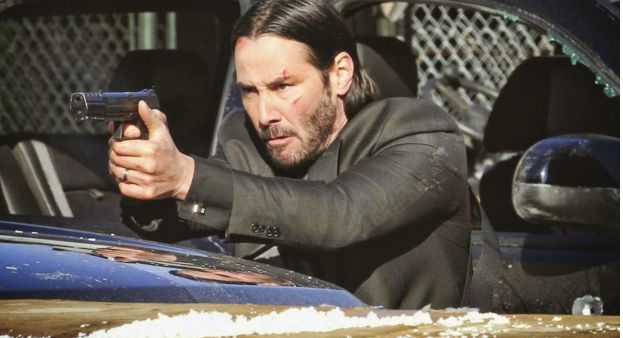
Make no mistake, there’s little in the way of originality where David Leitch and Chad Stahelski’s John Wick is concerned. It’s a simple story you know well – a man of violence, in an attempt to put his past behind him, settles down with a family and starts a new life. However, fate intervenes, his happiness is shattered and he’s compelled to take up his old ways in order to exact revenge and set things right. Yes, you’ve seen this before, but rarely has a film of this sort been done as well as it has here, while the movie’s subtext not-so-subtly taps into a feeling of rage many in the audience may be feeling today.
John Wick (Keanu Reeves) is a man who’s come to understand how to keep his feelings in check. This proved vital in his past life as an assassin, as it was necessary he remained cool under pressure, while no small amount of personal tragedy which would crush a less-disciplined man has befallen him. His beautiful wife (Bridget Moynahan) of five years has succumbed to cancer, leaving him shattered and alone. Knowing her demise was in the offing, arrangements were made to have a small puppy delivered to their home after her death in order to help her husband cope with his grief. However, this is not meant to be, as one night, Wick’s home is invaded by reckless Russian hooligans who beat him senseless, steal his vintage sports car and kill his dog.
That one of the thieves – Iosef (Alfie Allen) – happens to be the spoiled son of the head of the Russian mafia in New York City, the formidable Viggo Tarasov (Michael Nyqvist), ensures that much firepower will have to be employed once Wick sets out on the vengeance trail. The movie doesn’t disappoint. In a recent interview, Leitch noted that there are 84 deaths in the film and I can attest that nearly every one is imaginatively executed (pun intended). There’s a visceral energy to the directors’ approach that prevents the movie from being another simple genre exercise. The choreography present in the film’s
four set pieces is elaborate, precise and a wonder to behold. That we are allowed to follow and witness the action is a welcome respite from the sort of hyperkinetic editing used in most modern films of this sort. Leitch and Stahelski employ long takes, allowing us to take in and appreciate the imagination and hard work that went into the balletic violence we’re witness to, much of it reminiscent of the visual style of Japanese director John Woo and the meticulously timed action of Jackie Chan. While the action is bracing, the viewer can’t help but marvel at the way it’s rendered.
Revenge stories have never gone out of style, and one of the reasons for this is because these tales are simple to understand and speak to our most basic feelings of right and wrong. There are no shades of gray in films of this sort. The bad guys are deplorable, deserving the violent deaths they meet. Our hero is sympathetic, completely justified in meting out the vengeance he’s so adept in dispensing. For our part, we come fully expecting to be manipulated. It’s as simple as that.
And while John Wick will never be accused of being intricately plotted, it is a movie distinctly of our time. There’s a widespread feeling of dissatisfaction and frustration being felt by many in this country right now. Obvious wrongs are being committed within our government as well as the private sector, and as the rich and powerful become more so, it’s easy to come to the conclusion that we are unable to do anything about it. However, John Wick is not hampered by the law or his conscience and possesses the proper skill set to make things right in his life. He is our avenging angel, our instrument of catharsis through which we can, at least for a little while, gain satisfaction in seeing all put right with extreme prejudice. No, this isn’t the most noble of sentiments, but it sure feels good.
Contact Chuck Koplinski at [email protected].